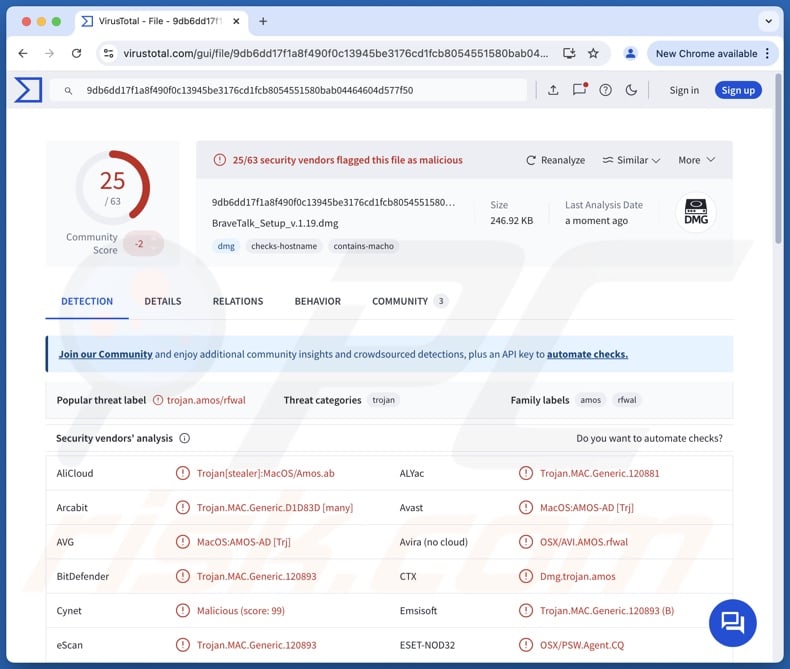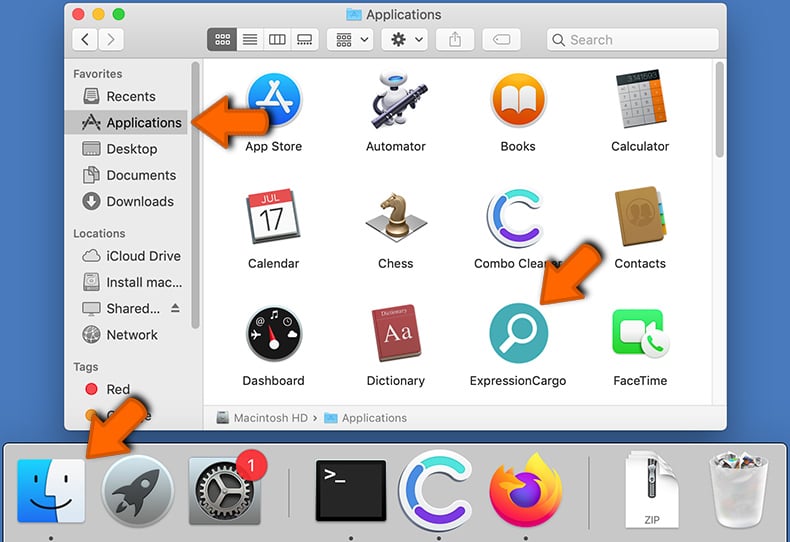Get free scan and check if your device is infected.
Remove it nowTo use full-featured product, you have to purchase a license for Combo Cleaner. Seven days free trial available. Combo Cleaner is owned and operated by RCS LT, the parent company of PCRisk.com.
What kind of malware is Multiverze?
Multiverze is a piece of malicious software targeting Mac operating systems (macOS). This malware aims to steal sensitive information from victims' devices. Multiverze has been noted being proliferated using social engineering tactics, specifically – through social media spam.

Multiverze malware overview
Multiverze is a malicious program designed to extract and exfiltrate data from compromised machines. At the time of writing, it is known that Multiverze targets Internet cookies and log-in credentials (usernames/passwords). This software could possess other functionalities or its developers could update it with additional/different features.
Malware developers often improve upon their programs and methodologies. Hence, it is likely that potential future iterations of Multiverze will be more streamlined or have other capabilities.
To summarize, the presence of malicious software like Multiverze on devices can lead to severe privacy issues, financial losses, and identity theft.
If you suspect that your device is already infected – immediately perform a full system scan with an anti-virus and eliminate all threats.
| Name | Multiverze virus |
| Threat Type | Mac malware, Mac virus |
| Detection Names | Avast (MacOS:AMOS-AD [Trj]), Combo Cleaner (Trojan.MAC.Generic.120893), ESET-NOD32 (OSX/PSW.Agent.CQ), Kaspersky (HEUR:Trojan-PSW.OSX.Amos.ad), Full List Of Detections (VirusTotal) |
| Symptoms | Trojans are designed to stealthily infiltrate the victim's computer and remain silent, and thus no particular symptoms are clearly visible on an infected machine. |
| Distribution Methods | Infected email attachments, malicious online advertisements, social engineering, software 'cracks'. |
| Damage | Stolen passwords and banking information, identity theft, the victim's computer added to a botnet. |
| Malware Removal (Windows) |
To eliminate possible malware infections, scan your computer with legitimate antivirus software. Our security researchers recommend using Combo Cleaner. Download Combo CleanerTo use full-featured product, you have to purchase a license for Combo Cleaner. 7 days free trial available. Combo Cleaner is owned and operated by RCS LT, the parent company of PCRisk.com. |
Mac-targeting malware examples
We have investigated countless malware samples; PondRAT, TodoSwift, Cthulhu, and BeaverTail are merely some of our latest articles on Mac-specific malicious programs.
Malware can have a broad application or an incredibly specific purpose. However, regardless of how malicious software operates – its presence on a system threatens device integrity and user safety. Hence, all threats must be removed immediately upon detection.
How did Multiverze infiltrate my computer?
It has been reported that Multiverze is spread through social engineering involving social media spam. The known campaign took place on the X social media platform (more commonly referred to its by former name – Twitter). Victims were messaged directly, likely using hacked accounts.
In the reported campaign, the DMs were sent from an account alleging association with a well-known company and a significant number of followers. The spam messages concerned a potential collaboration/partnership.
Cyber criminals engaged in communication and scheduled a call. Minutes before the call, the criminals sent a link to a supposed meeting on Brave Talk. This is the name of a legitimate browser-based video conferencing tool developed by Brave Software, Inc. – the same developers behind the Brave browser.
The link led to the download of a fake Brave browser installation setup. When the cyber criminals were alerted of complications with setup, they sent installation instructions with screenshots. In all actuality, this is the installer for Multiverze.
It must be mentioned that other lures and techniques could be used to spread Multiverze. Phishing and social engineering are nigh standard in malware proliferation. Malicious programs are usually disguised as or bundled with regular software/media.
Malware is primarily distributed via malicious attachments/links in spam (e.g., DMs/PMs, social media/ forum posts, emails, SMSes, etc.), drive-by (stealthy/deceptive) downloads, malvertising, online scams, untrustworthy download sources (e.g., freeware and third-party sites, P2P sharing networks, etc.), illegal software activation ("cracking") tools, and fake updates
Some malicious programs can even self-spread through local networks and removable storage devices (e.g., external hard drives, USB flash drives, etc.).
How to avoid installation of malware?
We strongly advise approaching incoming emails, DMs/PMs, SMSes, and other messages with caution. Attachments or links found in suspect/irrelevant mail must not be opened, as they can be harmful or malicious. We recommend being vigilant while browsing since the Internet is full of deceptive and dangerous content.
Additionally, all downloads must be made from official and verified channels. Programs must be activated and updated using functions/tools provided by legitimate developers, as those obtained from third-parties may contain malware.
We must emphasize the importance of having a reputable anti-virus installed and kept updated. Security software must be used to perform regular system scans and to remove detected threats and issues. If you believe that your computer is already infected, we recommend running a scan with Combo Cleaner Antivirus for Windows to automatically eliminate infiltrated malware.
Instant automatic malware removal:
Manual threat removal might be a lengthy and complicated process that requires advanced IT skills. Combo Cleaner is a professional automatic malware removal tool that is recommended to get rid of malware. Download it by clicking the button below:
DOWNLOAD Combo CleanerBy downloading any software listed on this website you agree to our Privacy Policy and Terms of Use. To use full-featured product, you have to purchase a license for Combo Cleaner. 7 days free trial available. Combo Cleaner is owned and operated by RCS LT, the parent company of PCRisk.com.
Quick menu:
Potentially unwanted applications removal:
Remove potentially unwanted applications from your "Applications" folder:

Click the Finder icon. In the Finder window, select "Applications". In the applications folder, look for "MPlayerX","NicePlayer", or other suspicious applications and drag them to the Trash. After removing the potentially unwanted application(s) that cause online ads, scan your Mac for any remaining unwanted components.
DOWNLOAD remover for malware infections
Combo Cleaner checks if your computer is infected with malware. To use full-featured product, you have to purchase a license for Combo Cleaner. 7 days free trial available. Combo Cleaner is owned and operated by RCS LT, the parent company of PCRisk.com.
Frequently Asked Questions (FAQ)
My computer is infected with Multiverze malware, should I format my storage device to get rid of it?
No, malware removal rarely necessitates formatting.
What are the biggest issues that Multiverze malware can cause?
The dangers posed by an infection depend on the malware's functionalities and the cyber criminals' goals. At the time of writing, Multiverze seeks browser cookies and log-in credentials (other functions are not unlikely). Generally, infections of this kind can result in serious privacy issues, financial losses, and identity theft.
What is the purpose of Multiverze malware?
The most common motivation behind malware attacks is financial gain. However, cyber criminals can also use malicious software to amuse themselves, realize personal grudges, disrupt processes (e.g., websites, services, companies, organizations, etc.), engage in hacktivism, and launch political/geopolitically motivated attacks.
How did Multiverze malware infiltrate my computer?
Multiverze has been observed being spread via sophisticated social media spam campaigns. Other distribution methods are possible.
Aside from various types of spam, malware is commonly proliferated through online scams, drive-by downloads, malvertising, dubious download sources (e.g., freeware and free file-hosting websites, Peer-to-Peer sharing networks, etc.), illegal software activation tools ("cracks"), and fake updates. What is more, some malicious programs can self-spread via local networks and removable storage devices.
Will Combo Cleaner protect me from malware?
Yes, Combo Cleaner is designed to scan devices and remove all kinds of threats. It can detect and eliminate most of the known malware infections. Keep in mind that running a complete system scan is crucial since sophisticated malicious programs tend to hide deep within systems.
Share:

Tomas Meskauskas
Expert security researcher, professional malware analyst
I am passionate about computer security and technology. I have an experience of over 10 years working in various companies related to computer technical issue solving and Internet security. I have been working as an author and editor for pcrisk.com since 2010. Follow me on Twitter and LinkedIn to stay informed about the latest online security threats.
PCrisk security portal is brought by a company RCS LT.
Joined forces of security researchers help educate computer users about the latest online security threats. More information about the company RCS LT.
Our malware removal guides are free. However, if you want to support us you can send us a donation.
DonatePCrisk security portal is brought by a company RCS LT.
Joined forces of security researchers help educate computer users about the latest online security threats. More information about the company RCS LT.
Our malware removal guides are free. However, if you want to support us you can send us a donation.
Donate
▼ Show Discussion